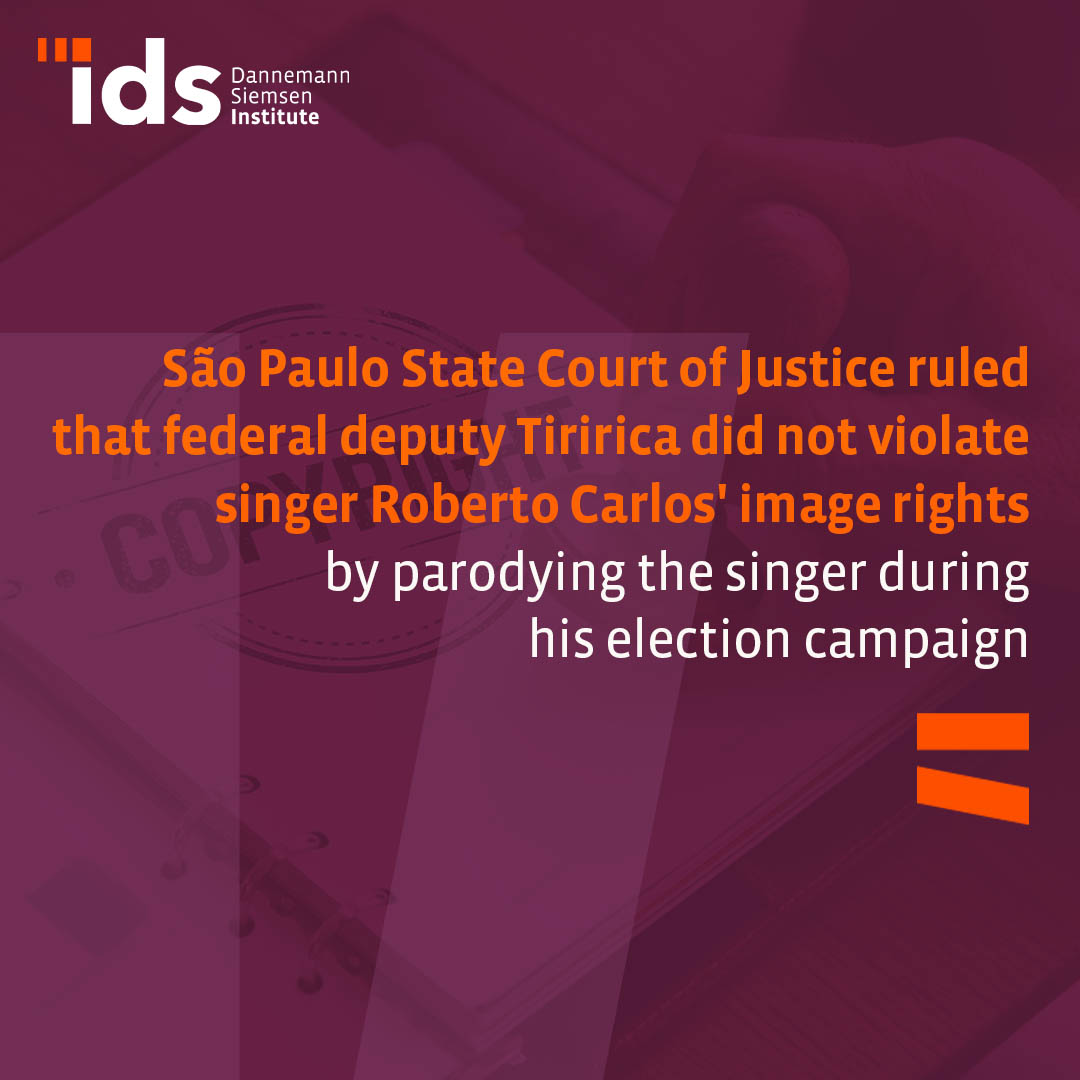19 de setembro de 2024
Share
São Paulo State Court of Justice ruled that federal deputy Tiririca did not violate singer Roberto Carlos’ image rights by parodying the singer during his election campaign
On August 16, in a collegiate decision, the 8th Chamber of Private Law of the São Paulo Court of Justice (TJSP) rejected the appeal of singer Roberto Carlos in a lawsuit he filed against current federal deputy Tiririca for the parodied use of his image and music during the 2022 election campaign. In the court’s opinion, the singer did not prove that his image or reputation had been damaged as a result of the parody, and there was not manifestly disreputable or offensive content to Roberto Carlos’ honor and/or image in the electoral propaganda, nor was there any element that could mislead the voter.
The dispute between the singer Roberto Carlos and the then candidate for the position of deputy Tiririca began in 2022, when the artist filed a lawsuit over Tiririca’s broadcasting of a political advertisement in which he asked voters for their votes, impersonating the singer and parodying a song of his, entitled “O Portão”. Although the melody was the same as the original song, the parodied lyrics referred to the campaign itself, saying: “I voted, I’ll vote again. Tiririca, Brasília is your place”.
The artist asked for the content to be removed from circulation, in addition to the payment of moral damages for the violation of his image rights, arguing that the advertisement: (i) made a direct and undue association of the plaintiff with the defendant’s campaign for deputy; (ii) inferred that the plaintiff voted for the candidate and “will vote again” for the defendant; (iii) was in dubious taste, as well as having an aggressive tone with the singer threatening to “throw the microphone in the face” of a fan; and (iv) misled the public into the idea of the singer’s false endorsement of the candidate. In this sense, the plaintiff also pointed out that Resolution 23.732 of the Superior Electoral Court (TSE), in its article 23-A, prohibits the unauthorized use of artistic works, even in the form of parody, recognizing the right of artists to request the cessation of conduct in connection with political propaganda. In the first instance, the request was dismissed, in which case the judge ruled that “the author is an artist of notorious national and international recognition, and there is no sufficient demonstration in the case file that the content in question has achieved sufficient damaging potential to question his suitability with the public or even question attributes built up over decades of solid work, proof of which was his responsibility”.
On appeal, the TJSP followed the previous understanding and, first, denied that the singer was right in his argument that the electoral propaganda carried out in 2022 cannot be considered a parody, because, as already recognized by the Superior Court of Justice, “parody uses debauchery and/or irony to entertain”’, “to promote uncriticism” or “reflection on the original work (”target-parody“)” or “any other theme (”weapon-parody“)”. Then, with regard to TSE Resolution 23.732, the ruling stressed that its understanding could not be raised, since the subject of the lawsuit refers to an advertisement for the 2022 election campaign and the resolution was created later, in 2024, and does not have retroactive effect for previous election advertisements.
The court also commented that it did not see in the electoral propaganda any content that was manifestly disreputable or offensive to the singer’s honor and/or image, protected by art. 5, item X, of the Federal Constitution, or “the presence of elements that could mislead the voter, to justify the drastic measure of restriction of the right to freedom of expression, enshrined in art. 5, item IX, of the Magna Carta”. Likewise, the court emphasized that “the satirical nature of the political propaganda in question does not infer that the appellant supported the candidacy of the appellee, nor that he would ‘again’ vote for him. The aim was to make voters laugh and to attract votes”.
Thus, even taking into account Roberto Carlos’ notoriety and his influence as an artist, the 8th Chamber judged that there was “no evidence in the case file that his reputation, honor or image had been damaged by the appellee’s 2022 election propaganda, which did not exceed the limits of the exercise of his right to freedom of expression, as was well pointed out in the sentence”. Based on this understanding, the court inferred that there had been no violation of personality rights as a result of the electoral propaganda, decreeing that the action be dismissed.
The judgment can be accessed via the link: Apelação n° 1094614-05.2022.8.26.0100
Note: For quick release, this English version is provided by automated translation without human review.
